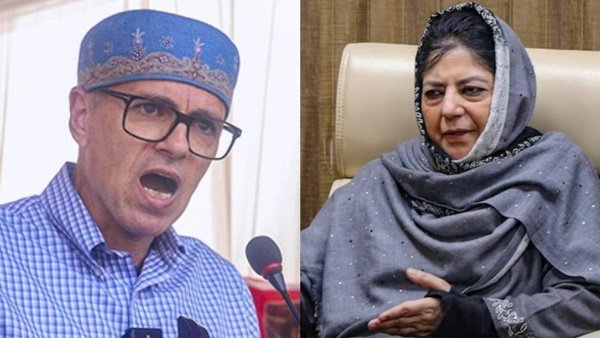Kashmir’s Political Blame Game Reignites
By: Javid Amin | 08 November 2025
As Jammu & Kashmir braces for the November 2025 bypolls in Budgam and Nagrota, the region’s political temperature has reached a boiling point. Two of its most prominent leaders — Omar Abdullah of the National Conference (NC) and Mehbooba Mufti of the Peoples Democratic Party (PDP) — have once again locked horns over the question that continues to define J&K’s politics:
Who is responsible for the fall of Jammu & Kashmir from statehood to Union Territory?
For Omar Abdullah, the answer is clear — the PDP’s 2015 alliance with the BJP.
For Mehbooba Mufti, however, the real betrayal lies in the NC’s failure to govern effectively and its tendency to “hide behind emotional politics.”
The result is a high-voltage political duel — one that exposes the deep ideological fissures within Kashmir’s mainstream politics and mirrors the broader crisis of trust among its people.
Omar Abdullah’s Charge: “PDP’s Alliance Cost Kashmir Its Identity”
In a series of fiery speeches across Budgam and Srinagar, Chief Minister Omar Abdullah has revived an old accusation with new urgency: that the PDP-BJP alliance of 2015 was the turning point that “unraveled the constitutional fabric of Jammu and Kashmir.”
“The destruction didn’t start in 2019,” Omar said during a public rally in Budgam.
“It started the day PDP invited the BJP into our homes in 2015. That was the day Kashmir’s identity began to crumble.”
The Context: A Coalition of Contradictions
The PDP-BJP alliance, forged after the 2014 J&K Assembly elections, was billed as a “coalition of convergence” — an attempt to bridge the Valley’s aspirations with the national narrative.
But within months, ideological contradictions surfaced.
While PDP sought soft separatism and dialogue, the BJP championed full integration.
For many Kashmiris, the alliance represented not reconciliation but capitulation.
Omar’s argument hinges on this perceived betrayal — that the PDP’s choice to align with the BJP legitimized the saffron party’s presence in J&K’s governance, paving the way for the abrogation of Article 370 four years later.
From 2015 to 2019: The Road to Article 370’s Abrogation
To understand Omar’s criticism, one must trace the timeline:
-
March 2015: PDP-BJP form government under Mufti Mohammad Sayeed.
-
January 2016: Mufti Sayeed dies; Mehbooba Mufti hesitates to renew alliance but ultimately does.
-
2016–2018: Unrest following Burhan Wani’s killing; trust deficit widens.
-
June 2018: BJP withdraws support, toppling the PDP-led government.
-
August 2019: Article 370 abrogated; J&K downgraded to a Union Territory.
From Omar’s perspective, this timeline illustrates a chain reaction set off by PDP’s political misjudgment — a decision that not only backfired but altered Kashmir’s identity forever.
Omar’s Message: “Destruction Began with PDP, Not Delhi Alone”
Omar Abdullah’s narrative is as much about reclaiming political morality as it is about electoral strategy.
He portrays the NC as the guardian of Kashmir’s dignity, contrasting it with the PDP’s alleged “lust for power.”
“We in the NC have made mistakes, but we never sold our soul for a few seats. The PDP did, and Kashmir paid the price,” he declared.
By shifting the blame for J&K’s loss of autonomy onto Mehbooba Mufti’s party, Omar aims to reshape public memory — transforming PDP’s past governance into a symbol of betrayal and NC’s restraint into a badge of integrity.
Mehbooba Mufti’s Counterattack: “Budgam Betrayed, NC’s Promises Turned to Dust”
In a swift and sharp counter, Mehbooba Mufti accused Omar Abdullah and the NC of “deceiving the people of Budgam” and “failing to deliver even basic promises.”
During a rally in the same district, Mehbooba fired back:
“They promised jobs, development, and dignity — what did they deliver? Dust. Budgam has been betrayed again and again by the NC’s hollow assurances.”
The Counter-Narrative: “We Tried, They Collapsed”
Mehbooba’s defense of the PDP’s 2015 alliance rests on intent: that her father, Mufti Mohammad Sayeed, sought peace and reconciliation, not political gain.
She has repeatedly stated that the coalition was meant to “build bridges, not burn them.”
According to her, the NC’s moral grandstanding is hypocritical — considering its own history of compromises with Delhi during the Sheikh Abdullah and Farooq Abdullah eras.
“They talk about selling out to Delhi,” she said. “But who signed the Indira-Sheikh Accord? Who compromised autonomy first?”
Her message seeks to equalize the moral ledger — arguing that all mainstream parties in J&K have engaged with Delhi, but only PDP did so transparently, with dialogue as its goal.
Political Irony: Two Sides of the Same Legacy
Ironically, both Omar Abdullah and Mehbooba Mufti share more in common than they admit.
Both are dynastic leaders, inheriting political legacies built on the promise of autonomy and dialogue.
Both have served as Chief Ministers under coalition pressures.
And both now face public skepticism over the erosion of J&K’s special status and economic stagnation.
Their current rivalry, therefore, is as much about rewriting history as it is about electoral positioning.
The 2015 Alliance: A Gamble That Backfired
When the PDP and BJP formed a coalition, it was hailed as a “political experiment” — one meant to merge Kashmir’s regional aspirations with India’s nationalist mainstream.
But the alliance collapsed under its own contradictions.
While the BJP pursued integration, the PDP tried to sustain its regional identity — a balancing act that proved impossible.
By 2018, the BJP withdrew support, citing “failure to control terrorism and radicalization.”
The fallout devastated the PDP’s credibility, with many in Kashmir viewing it as a betrayal of trust.
Omar Abdullah’s current campaign taps into that wound — reminding voters that the “Delhi handshake of 2015” was the handshake that changed Kashmir’s destiny.
Mehbooba’s Rebuttal: “We Paid the Price, Not the NC”
In her speeches, Mehbooba Mufti has tried to humanize PDP’s fall from grace — portraying herself as a political scapegoat who “paid the price for believing in dialogue.”
“We tried to protect J&K’s interests from within the system. For that, we were humiliated and jailed. Where were the others then?”
She often references her 2019 detention under the Public Safety Act (PSA) as proof that she stood up for Kashmiri dignity, even as the Centre moved to abrogate Article 370.
This personal dimension — a woman leader standing against the tide — remains central to her political brand and appeal among PDP loyalists.
Political Strategy: Competing for the Same Voter
The Omar-Mehbooba rivalry is not ideological as much as it is strategic.
Both compete for the same demographic — the traditional Kashmiri voter who values identity, dignity, and regional pride.
Omar’s Approach:
-
Focus on statehood restoration and governance reform
-
Frame PDP as a power-hungry enabler of BJP’s agenda
-
Rebuild NC as a moral opposition capable of leading the next phase of J&K’s revival
Mehbooba’s Approach:
-
Invoke emotional accountability — “we made mistakes, but we didn’t abandon you”
-
Present herself as a victim-turned-survivor of Delhi’s betrayal
-
Appeal to women and youth, emphasizing empathy and grassroots politics
Both leaders are aware that the BJP’s quiet presence in Jammu and south Kashmir could capitalize on this division.
The Broader Political Landscape: Old Battles, New Stakes
The Budgam and Nagrota bypolls are more than local contests — they’re referendums on party relevance in post-Article 370 Kashmir.
-
For Omar Abdullah, victory means reaffirming NC’s dominance and moral legitimacy.
-
For Mehbooba Mufti, it’s a chance to prove PDP’s survival instinct in a hostile environment.
-
For the BJP, it’s about retaining symbolic footholds to validate the post-370 order.
The Voter’s Dilemma
Most voters, however, remain disillusioned.
Years of political turmoil, broken promises, and economic uncertainty have left Kashmiris skeptical of both narratives.
The average voter’s question is not “who is right?” but “who can deliver?”
Public Sentiment: Between Nostalgia and Need
Street interviews and ground reports from Budgam, Pulwama, and Baramulla suggest a growing gap between emotional politics and daily realities.
While older voters speak of “identity, dignity, and betrayal,” younger voters prioritize jobs, stability, and internet freedom.
As one shopkeeper in Budgam put it:
“Every leader blames the other for 2019. But who will bring our businesses back?”
This sentiment underscores a generational shift — from ideological loyalty to pragmatic expectation.
The Unfinished Debate on Statehood
At the heart of the current rhetoric lies one unchanging demand — the restoration of full statehood to Jammu and Kashmir.
Omar Abdullah’s government has made statehood restoration its political centerpiece, vowing not to join any central government process without it.
The PDP supports the same demand, but its credibility is questioned due to its past partnership with Delhi.
Despite promises from the Union Home Ministry, timelines for restoration remain ambiguous, adding to the sense of political limbo that pervades J&K.
Analysts Weigh In
Political experts view the ongoing blame game as a rehearsal for 2026 Assembly elections.
Dr. Altaf Bukhari, political commentator:
“Both Omar and Mehbooba are trying to occupy the moral high ground. But the people are no longer moved by rhetoric. They want economic recovery and institutional stability.”
Prof. Shazia Khan, political sociologist:
“The 2015 PDP-BJP alliance remains a trauma in Kashmiri political memory. Omar is using that as an emotional trigger, while Mehbooba is reframing herself as a wronged reformer.”
Both perspectives highlight how identity politics continues to overshadow governance issues in J&K.
What Lies Ahead: A Region Still in Search of Stability
As Jammu & Kashmir continues to adjust to its post-statehood reality, one truth endures:
The region’s political future will be shaped less by history and more by credibility, delivery, and dialogue.
Both Omar Abdullah and Mehbooba Mufti face the same test —
Can they move beyond the blame narrative and present a clear vision for the next decade?
For now, their exchanges reflect a political theater of echoes — each leader trying to outshout the other in a battle that the people may already have tuned out of.
Bottom-Line: Between Blame and Belief
The Omar Abdullah vs Mehbooba Mufti showdown has reopened old wounds about betrayal, autonomy, and accountability.
It has also reignited debate over whether Kashmir’s mainstream politics can ever recover from its trust deficit.
Both leaders claim moral superiority, but for ordinary Kashmiris, the yardstick remains unchanged:
Who will restore dignity, development, and democracy?
Until one delivers on those promises, the rhetoric — however sharp or emotional — will remain just that: words echoing across the mountains of a region still waiting for renewal.



